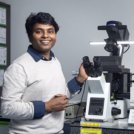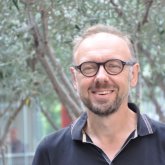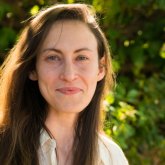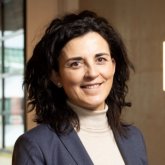PhD position “Synthetic Active Matter: Unravelling 3D Real-Space Dynamics”
Are you a curious and motivated individual eager to explore the physics of life-like systems?
Join us on a high-impact PhD journey into the fascinating world of autonomous motion, collective behavior, and self-organization in 3D soft matter. This fully funded position, supported by my ERC Consolidator Grant, offers a unique opportunity to push the frontiers of synthetic active matter and contribute to a rapidly growing research field.
The project focuses on the experimental realization and study of artificial microswimmers/microrobots that can move and interact autonomously in 3D environments, mimicking the complex dynamics of microorganisms in fluids.
Living systems such as bacteria or algae exhibit remarkable capabilities: they swim, adapt, interact, and self-organize into dynamic patterns. Understanding and replicating these life-like dynamics in synthetic systems remains a major challenge across physics, chemistry, biophysics, and materials science.
In this PhD project, you will:
- Develop an experimental platform to study 3D self-organization of active particles.
- Fabricate and characterize light-driven microswimmers.
- Use advanced optical microscopy and particle tracking to analyze their motion and interactions. Investigate emergent behaviors such as swarming, clustering, and collective navigation in confined and complex environments.
The project will build on an interdisciplinary approach, combining concepts and methods from physics, chemistry, and mathematical modelling.
The long-term goal is to derive design principles for constructing smart, adaptive microsystems, potentially useful for targeted drug delivery, cargo transport, biosensing, microfluidic mixing, or self-healing materials.
The successful candidate will join the Active Soft Matter Lab within the TNW Faculty, the MESA+ Institute for Nanotechnology, University of Twente, Enschede, The Netherlands. This position offers ample opportunities for collaboration and interaction with various academic and industrial partners. You will work in a dynamic, highly interdisciplinary environment, utilizing state-of-the-art equipment and facilities to further the understanding and applications of microswimmers.
Starting Date: 1st November 2025 (but negotiable)
References:
1. Vutukuri, et al., **Nature**, **586**, 52, 2020.
2. Vutukuri, et al., **Nat. Communi**, **11**,2686, 2020.
3. Susana, et al., **Nat. Communi**, **14**,7896, 2023.
Information and application
Selection process:
Please submit your online application before 7th Oct 2025 for full consideration. Your application should include the following documents:
- Cover letter in which you describe your motivation, qualifications, and research experience for the position (max 1 page)—possible starting date.
- Curriculum vitae, including a list of publications (if applicable).
- Digital bachelor and master transcripts.
- Name and contact details of two references who worked closely with you.
Note that we accept applications submitted through our online application portal
Screening is part of the selection process.
About the department
Our lab Active Soft Matter is part of the Faculty of Science and Technology and the MESA+ Institute for Nanotechnology at the University of Twente, Enschede, The Netherlands. We focus on active soft matter and bioinspired materials, combining fundamental physics with cutting-edge experimental techniques.
About the organisation
The Faculty of Science & Technology (Technische Natuurwetenschappen, TNW) engages some 700 staff members and 2000 students in education and research on the cutting edge of chemical technology, applied physics and biomedical technology. Our fields of application include sustainable energy, process technology and materials science, nanotechnology and technical medicine. As part of a people-first tech university that aims to shape society, individuals and connections, our faculty works together intensively with industrial partners and researchers in the Netherlands and abroad, and conducts extensive research for external commissioning parties and funders. Our research has a high profile both in the Netherlands and internationally and is strengthened by the many young researchers working on innovative projects with as doctoral candidates and post-docs. It has been accommodated in three multidisciplinary UT research institutes: Mesa+ Institute, TechMed Centre and Digital Society Institute.





